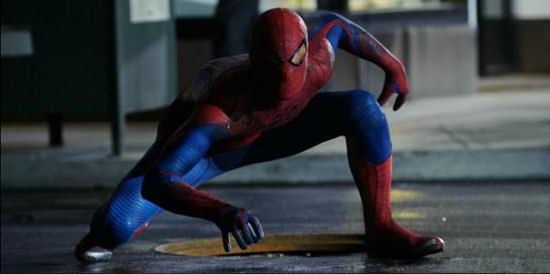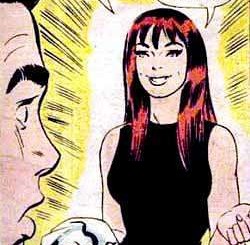 If you liked the part in Spider-Man 3 when Toby Maguire’s Peter Parker got all moody and emo, then you’re going to love Andrew Garfield’s interpretation of the character in the franchise reboot The Amazing Spider-Man.
If you liked the part in Spider-Man 3 when Toby Maguire’s Peter Parker got all moody and emo, then you’re going to love Andrew Garfield’s interpretation of the character in the franchise reboot The Amazing Spider-Man.
Here we have a high school Peter Parker who has abandonment issues over the deaths of his parents and oft times takes them out on his loving Uncle Ben (Martin Sheen) and Aunt May (Sally Field). And while his time spent underneath a mask as Manhattan’s swinging superhero is often seen as a chance for Peter to let his hair down so to speak and have some fun, this version of Spider-Man has more of a single-minded mission. And best (or worst) of all, we can count on this portrayal continuing into at least the next installment of the franchise as none of these character issues are really resolved. It is as if director Marx Webb doesn’t realize that we already have a grim and gritty comic book film this month in the form of Christopher Nolan’s upcoming The Dark Knight Rises.
Peter Parker is not your typical teen. While extraordinarily smart, he is having trouble fitting in at school, which is surprising considering that he goes to Midtown Science High School which sounds like it would be an environment rich with like-minded teens. But Peter keeps himself isolated, still hurting from the death of his parents a decade earlier. When his Uncle Ben finds an old briefcase of his father’s, Peter starts to investigate the events surrounding his parents’ deaths. The trail leads him to OsCorp and Dr. Curt Connors (Rhys Ifans), a former colleague of Peter’s father. Connors is researching how animal genetics could help improve humans. While snooping around Connor’s lab, Peter is bitten by a spider and soon finds himself with enhanced strength and the ability to crawl up walls. But when Connors turns his research on himself, he finds himself transformed into a seven-foot-tall half-human, half-lizard monster. Following the death of his uncle at the hands and gun of a petty thief, Peter starts using his powers to try and catch the killer only to become a target of the New York City police.
That description makes the film seem much more densely plotted than it actually is. Some storylines are introduced only to be abandoned. The mystery of Peter’s parents is only there to lead him to Connors after which it is conveniently forgotten until the mid-credits button scene in which the filmmakers suddenly remember that this particular thread is still unresolved and make a quick promise to possibly return to the issue in a sequel. Likewise, a plotline involving an OsCorp executive demanding that Connors escalate his work to human trials exists only to force the character to test the serum on himself so he would turn into the villain of the piece.
While I will get to some of the film’s flaws, I did want to address a few of the things that it got right. First off, the teenage awkwardness between Peter and his high school crush Gwen Stacy (Emma Stone) feels spot on. The portrayal of Connors/The Lizard as an ersatz Jekyll and Hyde works well enough to make you wish that the movie spent more time on it. A sequence at the beginning of the film’s climax where New Yorkers rally to help Spider-Man delivers perhaps the film’s most emotional moment.
 I will admit that it is hard not to compare this new iteration of the Spider-Man story to the director Sam Raimi’s trilogy that has come before. Not just because Raimi’s films are still in the relatively recent past but because their popularity have cemented a certain version of the character in the public’s imagination. Webb’s new reinvention of the Spider-Man mythos almost seems to court such comparisons though and when examining them we can find some to be problematic.
I will admit that it is hard not to compare this new iteration of the Spider-Man story to the director Sam Raimi’s trilogy that has come before. Not just because Raimi’s films are still in the relatively recent past but because their popularity have cemented a certain version of the character in the public’s imagination. Webb’s new reinvention of the Spider-Man mythos almost seems to court such comparisons though and when examining them we can find some to be problematic.
Among comic book fans, one of the most controversial aspects of Raimi’s films was the change of Spider-Man’s webshooters being an invention of Peter’s to yet another change in his body brought about by that radioactive spider bite. Amazing Spider-Man wants to emphasize Peter’s boy genius side by returning to the idea that he built his webshooters, but then proceeds to undercut it by having the actual web fluid be something he stole from OsCorp.
I also found it hard to believe that while Peter has often wondered about his parents, it was not until the discovery of his father’s attaché case that he decided to start actively trying to find out about them. Credulity is further strained when we see how much information was obtained by a relatively simple internet search. If Peter’s so smart how is it he never thought to do a simple search engine query?
But the biggest wrong note that the film hits is how it treats Peter’s reaction to his Uncle Ben’s death. This is the moment where Peter embraces the Spider-Man story’s well-known theme of great power bringing great responsibility. Instead, this film uses that moment to turn Peter into a vigilante, only stopping crimes being committed by men who match the description of his uncle’s killer.
And even by the end of this new film, Peter has not embraced the responsibility of his powers. This is a point that is firmly driven home in the film’s very last line of dialogue before the credits begin rolling. Peter may have changed physically over the course of the film, thanks to him receiving his powers, but he still seems to be the same self-absorbed kid he was at the start of the film with no emotional growth or maturity. This leaves us with the true meat of Peter’s origin to be stretched out over a succession of sequel films and that feels like a decision made more in a boardroom than anywhere else in the creative process.





Eh…
This is more about your (rather lame and limited) expectations than the movie that was on the screen.
Actually, It seems more like an expectation of a true comic book fan.
Your pathetic attempt to mark it “lame and limited” just shows your lack of enthusiasm/knowledge to the genre, followed by your lack of intelligence.
The only expectations I have when going into a film that adapts a story from another medium is that the filmmakers remain true to the overall story and themes of the original material during the adaption process. (Two examples – While the character of Tom Bombadil adds a certain extra layer of detail about the world of Middle Earth, he does not serve an immediate story puropse so his exclusion by Peter Jackson from the film adaption of THE LORD OF THE RINGS doesn’t really bother me. While the 1998 American GODZILLA is a fun giant monster movie, it lacks… Read more »
Great, now my review is going to seem like I’m sucking up to that bozo.